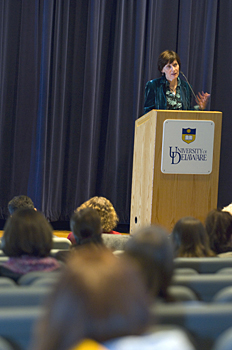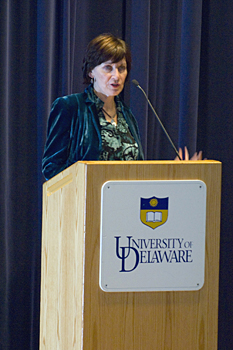Sponsored by UD's Women's Studies Program, Corrigan's lecture, the second in the Mae and Robert Carter Lecture Series, focused on women's adventure stories, particularly those written by late 18th-century and early 19th-century authors Jane Austen and Charlotte Bront‘.
Before launching into her lecture, Corrigan--who was introduced by both Monika Shafi, director of UD's Women's Studies Program and Elias Ahuja Professor of Foreign Languages and Literatures, and Margaret Stetz, Mae and Robert Carter Professor of Women's Studies at UD--thanked Mae and Robert Carter, who were honored guests at the event, and talked a little about the book review process.
“I get about 75 books in the mail per week sent to me at my home, unsolicited,” Corrigan said, “and while it's puzzling that I get some of the books I do, one of the perks of being a book critic for NPR is reviewing books that run the gamut.”
Corrigan then spoke of her own book, Leave Me Alone, I'm Reading!, published in 2005 by Random House, and said that the flurry of responses to her chapter on women's adventure tales sent her further down a path of research into why that genre resonated with so many readers.
“We saw an incredible resurgence of adventure books in recent years dealing particularly with the theme of man against nature,” Corrigan said, “and, as it's my job to stay on the cutting edge of literature, I wondered why there were suddenly so many testosterone-charged stories that in the end left their heroes bloody but unbowed. What intrigued me about women's adventure stories is that they seemed fundamentally different.”
Corrigan said that this theory gelled further after she read and reviewed Anna Quindlen's novel Black and Blue, a story about a battered wife running from her husband.
“I like the novel a lot,” she said, “but I was also carried away by how the heroine takes in a breath and waits, because that's all she can do, and that got me thinking about other novels in which women do the same thing. Then I began wondering if there was any way these novels do something more, and I reached the conclusion that there is.”

She emphasized that although such novels are often thought of as melodramatic, they entail profound sacrifices and differ from typical men's adventure stories in what is being risked.
“Men risk their lives, and women are threatened by their loss of sanity and sense of self,” she said. “And as men typically seek adventure in packs and women alone, these heroines face a deep sense of isolation and loneliness. Their struggles are internal and psychological and emotional.”
Corrigan's reviews are frequently broadcast on the Peabody Award-winning, nationally syndicated NPR program Fresh Air (90.9 FM-Philadelphia). She is the critic in residence in Georgetown University's Department of English, where she also lectures on literature, and an expert on 19th-century British literature, women's autobiographical literature, detective fiction, contemporary American literature and Anglo-Irish literature. She also is a scholar of popular culture and her reviews appear regularly in Book World and the Washington Post.
Additionally, she is an adviser to the National Endowment for the Arts' “Big Read” Project and is on the advisory panel of the New American Heritage Dictionary. Besides her regular columns and Fresh Air segments, Corrigan also has written for the Village Voice, The New York Times, The Nation, the New York Observer and the Philadelphia Inquirer.
Article by Becca Hutchinson
Photos by Jon Cox


